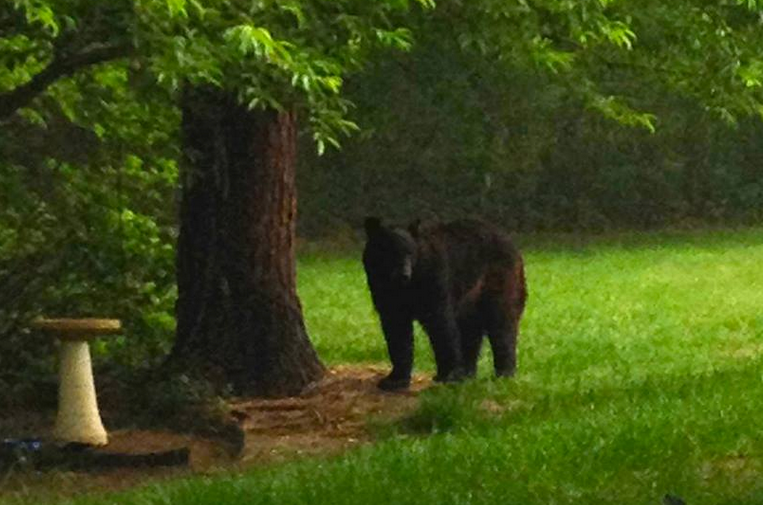Black bear removed from populated area in Manchester Wednesday

Photo courtesy of the Manchester Police Department.
The Manchester Police Department advises residents to take precautions following a black bear sighting in the township.
The black bear was spotted in the township’s Roosevelt City section Wednesday morning, police say, adding that the animal “is not believed to have caused any significant disturbances.”
Township police officers and the New Jersey Division of Fish and Wildlife responded and relocated the black bear to the Pasadena Wildlife Management Area, a tract of preserved land located in Ocean and Burlington counties, according to police.
Black bears, the largest land mammal in New Jersey, are “an integral part of the state’s natural heritage and a vital component of healthy ecosystems,” a Division of Fish and Wildlife guide notes. Since the 1980s, the state’s black bear population has been increasing and expanding in range from northwestern New Jersey to the south and east.
“Within the most densely populated state in the nation, black bears are thriving and there are now confirmed bear sightings in all 21 of New Jersey’s counties. Division of Fish and Wildlife personnel use an integrated approach to managing New Jersey’s black bear population, fostering coexistence between people and bears,” the guide states.
While black bears tend to be wary of people, police say, it is possible that the animal may wander back into residential areas, so residents are advised to become familiar with the bear safety tips published on the Division of Fish and Wildlife website.
The safety tips:
Never feed or approach a bear!
Remain calm if you encounter a bear.
Make the bear aware of your presence by speaking in an assertive voice, singing, clapping your hands, or making other noises.
Make sure the bear has an escape route.
If a bear enters your home, provide it with an escape route by propping all doors open.
Avoid direct eye contact, which may be perceived by a bear as a challenge. Never run from a bear. Instead, slowly back away.
To scare the bear away, make loud noises by yelling, banging pots and pans or using an air horn. Make yourself look as big as possible by waving your arms. If you are with someone else, stand close together with your arms raised above your head.
The bear may utter a series of huffs, make popping jaw sounds by snapping its jaws and swat the ground. These are warning signs that you are too close. Slowly back away, avoid direct eye contact and do not run.
If a bear stands on its hind legs or moves closer, it may be trying to get a better view or detect scents in the air. It is usually not a threatening behavior.
Black bears will sometimes “bluff charge” when cornered, threatened or attempting to steal food. Stand your ground, avoid direct eye contact, then slowly back away and do not run.
If the bear does not leave, move to a secure area.
Report black bear damage or nuisance behavior to the DEP’s 24-hour, toll-free hotline at 1-877-WARN DEP (1-877-927-6337).
Families who live in areas frequented by black bears should have a “Bear Plan” in place for children, with an escape route and planned use of whistles and air horns.
Black bear attacks are extremely rare. If a black bear does attack, fight back!
WHYY is your source for fact-based, in-depth journalism and information. As a nonprofit organization, we rely on financial support from readers like you. Please give today.

